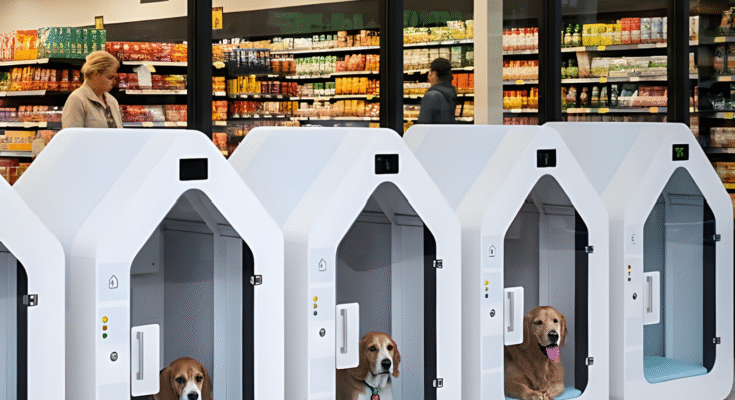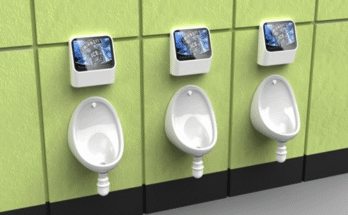Shopping with your dog can sometimes be a challenge. Many pet owners have faced that familiar dilemma — you’re on your way to grab groceries, but your loyal companion is sitting beside you in the car, tail wagging and eyes full of hope. Unfortunately, most supermarkets don’t allow dogs inside, and leaving them alone in the car can be dangerous, especially during hot or cold weather.
But in Germany, a simple and heartwarming idea is changing this situation for good. Supermarkets across the country are introducing something called “pet parking pads” — special, comfortable spaces where dogs can safely rest while their owners shop.
These aren’t just any waiting spots. Think of them as mini dog lounges — cozy, shaded kennels with proper ventilation, non-slip flooring, and secure doors to keep pets safe and relaxed. Many of these pads are temperature-controlled, ensuring a cool environment in the summer and warmth during colder months. Some even come equipped with water bowls and soft mats to make dogs feel at home.
The concept is both innovative and thoughtful, blending convenience with compassion. It’s part of a growing trend in Germany to design public spaces that are not only human-friendly but also considerate of pets.
Why Pet Parking Pads Matter
Leaving a dog in a parked car, even for a few minutes, can be risky. Inside a closed vehicle, temperatures can skyrocket within minutes — even if the windows are slightly open. Similarly, during winter, cars can turn freezing cold just as quickly. These conditions can lead to severe stress, dehydration, or even worse for pets.
Pet parking pads eliminate this worry completely. They provide a safe, shaded, and monitored area where dogs can wait comfortably. Owners can then take their time inside the store, knowing their furry friends are secure and happy outside.
It’s also a great way to reduce the guilt many dog owners feel when leaving pets at home or in the car. Instead of rushing through the aisles with one eye on the clock, shoppers can relax — their pets are right outside, comfortable and cared for.
How It Works
The process is simple. Outside many German supermarkets, you’ll find a row of these small, enclosed kennels near the entrance. Each “parking pad” has a lockable door that the owner can secure with a key or digital code. Some systems even allow smartphone access for easy locking and unlocking.
Once inside, the dog has enough space to sit, stand, and turn around comfortably. The kennel walls are often transparent or partially open, allowing fresh air to flow through while keeping the pet safely enclosed. In many cases, there’s a sensor or light indicator showing whether a kennel is occupied or available.
Stores like REWE, Edeka, and Aldi Süd have started experimenting with these installations, and the feedback has been overwhelmingly positive. Shoppers appreciate the convenience, and dogs seem to love their new resting spots too!
A Win for Everyone
Pet parking pads are a small idea with a big impact. For supermarkets, they’re a way to show they care about their customers’ lifestyles. For shoppers, they’re a stress-free solution to a common problem. And for dogs, they’re a safe, cool, and comfortable place to hang out.
It’s also a clever marketing move — one that builds loyalty. People tend to shop where they feel understood and valued. By offering something as simple as a dog-friendly waiting area, supermarkets strengthen their relationship with customers who consider pets part of the family.
A Thoughtful Future
Germany’s pet parking pads reflect a broader cultural trend: treating animals with respect and integrating their needs into everyday life. It’s a reminder that innovation doesn’t always mean high-tech gadgets or complicated systems. Sometimes, it’s about empathy, design, and simplicity.
As this idea spreads, we may soon see similar pet-friendly innovations in other countries — perhaps outside cafés, malls, or even public buildings. For now, Germany is leading the way, showing how a small change can make life easier, safer, and happier — not just for humans, but for their loyal four-legged friends too.


